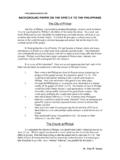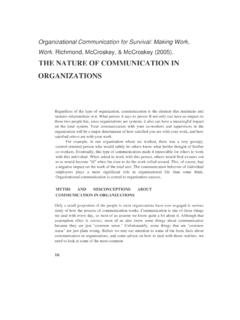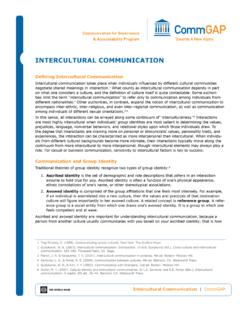Transcription of CHAPTER TWO: DEFINING YOUR GOVERNING …
1 CHAPTER TWO: DEFINING your GOVERNING VALUES. (From the book So Many Leaders, So Little Leadership To order a copy, please go to the Store section of this website.). In CHAPTER one, I stated that leadership starts from within a man or woman. It s a heart matter. As I ve studied successful leaders, I ve seen that they have often developed an inner set of values, whether they are aware that they have or not. Each one has a set of guidelines that help them make decisions, small or great. Some have written down these values and carry them in a notebook or planner; others carry them on the tablets of their heart. Most often these values were developed and defined from: Family examples, both positive and negative Mentoring relationships Religious teachings Life failures Suffering through tough times Watching other leaders whom they admired Watching other leaders whom they did not admire For instance, some who were taken advantage of have vowed never to do the same, and others, out of the same situation, decided to take advantage of as many people as possible.
2 Both have developed values that guide their decisions and develop their leadership style. Others have felt the pain of domineering leadership and decided to perpetuate that style; some hold the value not to rule with an iron fist, but rather with an open hand. Both have developed values. And without realizing it, you have developed some values, too. Robert Greenleaf, in his book, On Becoming a Servant Leader, stated This is the ultimate test: what values govern one s life at the end of it? He poses an interesting question, don t you think? 1. Dr. John W. Stanko Are you developing a set of values that adjust over your lifetime as your leadership grows and matures? You shouldn t wait until you re a leader to try to define these values, for by then you may not see the importance of such a task ( I m already a leader; why sweat the small stuff now when big decisions await?)
3 If you wait too long to reflect on your values, you may find that you ve already given your energy to values that weren t worth the effort you gave them. As most successful leaders, the Apostle Paul had a set of values that guided his ministry and ministry decisions: 1. Not taking financial support from the churches he was starting 2. Not working where someone had already labored to start a church 3. Always visiting the synagogue first when arriving in an area 4. Traveling in the company of a team 5. Not insisting on a Jewish lifestyle as he visited diverse cultures and people. Paul s success wasn t a matter of chance. At least part of his success came from the fact that he had a set of values that served to guide his life and work decisions. He didn t impose these values on others, for they belonged to him, having been shaped by his own experience and understanding of what God wanted him to do.
4 I m grateful to the Franklin Covey Company for helping me develop my values. While studying to become a certified time management facilitator through that company, their instructor directed all those being trained to write out our values. He told us there weren t a maximum or minimum number, and he encouraged us to write them in a positive style that related to the present ( I am ), and not the future ( I will ). Then he asked that we attempt to prioritize those values and from that point forward carry them with us for regular review and adjustment. The company s objective was to allow us to see our values and allow them to better guide our decisions, decisions we would be making as leaders. In fact, they called these values our GOVERNING values, since they do, sometimes without realizing it, govern our life and decisions.
5 I have to say that this has been a most rewarding experience. I. now regularly work with other leaders and potential leaders to help them develop a set of values that will guide (or are guiding) their life and leadership. 2. Dr. John W. Stanko I offer my own values as an example of how this can be done, not as a model list of values to be held. I developed mine by identifying my favorite passages from the Bible. I then did what Franklin Covey asked me to do: Put some narrative explanation to each value and prioritize them. Developing values, however, isn t a science with rigid rules and procedures;. rather it s an art. At the end of my list, I ll make some further recommendations of how to develop your list of GOVERNING values. Keep in mind that mine are based on a Christian life and worldview; they aren t offered with anything in mind except to give you a better understanding of my leadership style and what updated, prioritized GOVERNING values can look like.
6 GOVERNING VALUES John W. Stanko (Updated October 8, 2006). 1. I do the will of God. I prayed one time that I would be like Timothy, not fully realizing what I was praying. I saw Timothy in a whole new light as I read Philippians 2:19-23: I hope in the Lord Jesus to send Timothy to you soon, that I also may be cheered when I receive news about you. I have no one else like him, who takes a genuine interest in your welfare. For everyone looks out for his own interests and not those of Jesus Christ. But you know that Timothy has proved himself, because as a son with his father he has served with me in the work of the gospel. I hope, therefore, to send him as soon as I see how things go with me. The will of God, as I understand it, is to put other's interests before my own and to serve in furthering the gospel as the Holy Spirit and my oversight so direct.
7 That also involves a vibrant and diligent prayer and study life that seeks to find the will of God and do it. 2. I walk in faith. The writer of Hebrews wrote, "Without faith it is impossible to please God." I want to please the Lord by exercising faith in Him concerning my purpose, family, finances, future, and relationships. The second part of that verse completes the thought when it says, "because anyone who comes to him must believe that he exists and that he rewards those who earnestly seek him" (Hebrews 11:6). 3. Dr. John W. Stanko My faith will have practical expression through my giving habits as I'm generous with my time, knowledge, wisdom, and money. 3. I love my family. The Lord has given me three wonderful gifts: Kathy, John, and Deborah. The Apostle Paul commanded husbands to love their wives just as Christ loved the church and gave himself for her to make her holy, cleansing her by the washing with water through the word, and to present her to himself as a radiant church, without stain or wrinkle or any other blemish, but holy and blameless.
8 In the same way, husbands ought to love their wives as their own bodies (Ephesians 5:25-28). I want to love my wife and see her released to her purpose as a joint heir with me of the gracious gift of life (1 Peter 3:7). He also told fathers not to "embitter your children, or they will become discouraged" (Colossians 3:21). I want to be a friend and encourager to my children and release them to their God-given purpose. 4. I am a servant-leader. Because I am a man of purpose, I have a desire to express my purpose by serving the world in some capacity. Since my childhood, I've also found myself in leadership positions. Thus I want to combine those two roles servant and leader to be a servant- leader from a biblical perspective. I want to lead and serve according to God's will and implement my decisions in the right spirit and attitude.
9 Peter wrote, Be shepherds of God's flock that is under your care, serving as overseers not because you must, but because you are willing, as God wants you to be; not greedy for money, but eager to serve; not lording it over those entrusted to you, but being examples to the flock (1 Peter 5:2-3). I want to lead in the tradition of Jesus, Moses, Joseph, David, Solomon, and Daniel. I want to grow in my understanding of servant leadership, learning to listen well and to influence, not control others. I also want to be a leader of integrity and courage. 5. I am a communicator. Jesus was a great communicator. Mark reported that "the large crowd listened to him [Jesus] with delight" (Mark 12:37). That came from His insight into the Word, His love for people, and His effective speaking style.
10 I want to follow in His footsteps. Jesus also said, "The Father who sent me commanded me what to say and how to say it" (John 12:49). I want to have something to say and then know how to present it with clarity, humor, and conviction, whether speaking, writing books and articles or communicating through other media. I also want to study and effectively utilize humor to enhance my ability to 4. Dr. John W. Stanko communicate with others. I acknowledge too that I have a sense of humor that is God-given and I am committed to use it to the glory of God. 6. I am energetic. I became a servant of this gospel by the gift of God s grace given me through the working of his power (Ephesians 3:7). Paul accomplished his life purpose through the working of his [God's] power.













